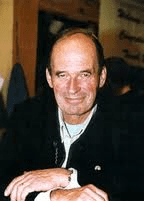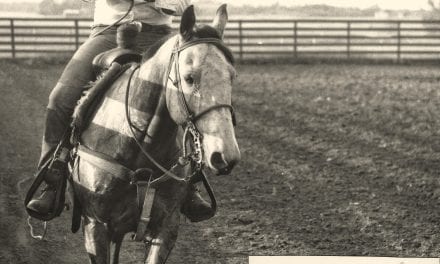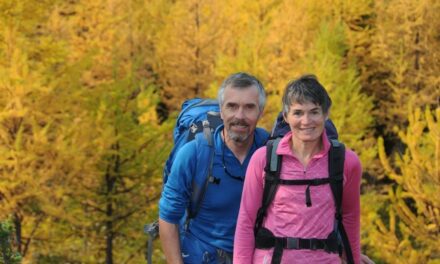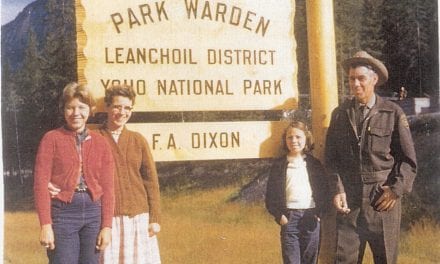This Oral History interview was funded in part by a research grant received in 2021 from the Government of Alberta through the Alberta Historical Resources Foundation.
Park Warden Service Alumni Society of Alberta
Oral History Project Phase 11 – Summer 2021
Telephone Interview with Derek Tilson
August 10, 2021 – 1:00 pm
Crooked Creek, AB and Invermere BC
Interviewed by Susan Hairsine
SH: What was your place and date of birth?
Derek: I was born in Victoria, British Columbia, on October 29, 1949.
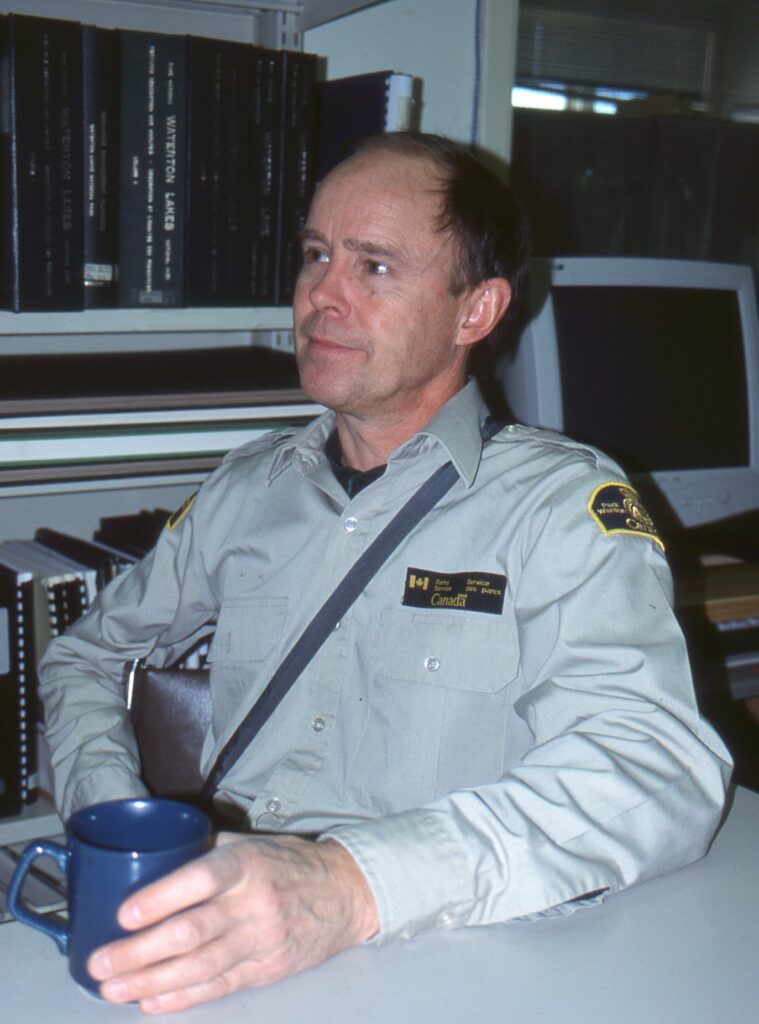
Photo courtesy of Edwin Knox.
SH: Where did you grow up?
Derek: I grew up in different places across Canada. My father was a pilot in the Armed Forces, flying fixed wing and helicopters doing search and rescue. So we lived on different air bases in Canada. You get posted around as an Air Force officer, so we were in Gimley, Manitoba. I was very young there. Then Trenton, Ontario, and then we moved to Ottawa, then to Bagotville, Quebec, and then we went back to Trenton, and finally we ended up heading out to Calgary. So, I was on the move growing up and I had a very wonderful upbringing.
SH: Wow, you were all over Canada. So then how did you become involved in the Warden Service? Which national park did you start working in?
Derek: Well that’s kind of an interesting one. When I finished High School I was going to the University of Calgary and I was walking down the hall one day with an acquaintance who was working as a seasonal park interpreter in Banff National Park. He asked me if I had a summer job and I said, “No, I didn’t.” and he said, “Why don’t you try to get a job with the National Parks?” So I did and my wife, Bev, and I ended up going to Jasper National Park where I worked as an interpreter for one year. While I was there I’d look out the window and kind of keep my ear to the ground about things and I learned about the Warden Service. That kind of intrigued me so I decided I’d see if I could move over from Interpretation into the Warden Service. I applied on the next competition and was accepted, and that’s how I got into the Warden Service. I’ve never forgotten that hallway conversation because it set the stage for a good part of my life.
SH: What year would that have been Derek?
Derek: That was 1972. I worked in Jasper for one year with a great team of interpreters. I learned a lot and had a lot of fun. Then, in 1973 we moved to Kootenay National Park where I spent one year working primarily with Terry Gibbons and Greg Keesey. I was on an upward learning curve and had a very good time there too.
I still remember showing up at Kootenay to start out as a new warden. Neil Woledge was the Chief Warden and when he saw me he must have thought, geez, what’s happening to the Warden Service. I must have looked to be about 16 years old back then, fresh right out of University. Anyway, our first meeting lasted only about 5 minutes. It was pretty much just, “Hello, here’s your hat and badge, here’s the keys to your truck. Go see Terry Gibbons and do what he says.”
So there I was, a brand new seasonal warden, a truck and a gun and a badge and no training or experience. It really was baptism by fire in those days. It was sink or swim and it could be a long way to the bottom if you couldn’t swim. Shortly after my arrival I was sent out to look for a missing hiker in the Numa Pass area and I barely even knew where the horses were kept and I had never been on the trail.
As another example, I remember being stationed out at Kootenay Crossing. At that time the solution to a problem involving bears was to destroy the bear. I never liked that, and I asked the old warden I was working with (not Terry Gibbons) if we could start immobilizing the bears and relocating them. He said, “That’s a lot of time and trouble but if you want to do it go ahead but I can’t help.” So I ended up ordering all the stuff, learning by phone and through catalogues. We got the equipment and soon we had a bear problem in McLeod Meadows Campground. Myself and another seasonal warden, Gordie Watkins, drove down the highway in the early evening, reading all the directions on dosage rates, how to load a dart, how to load the gun and so forth. We were also using a very risky drug called Anectine. Anyway, we finally found the bear in the campground and shot the dart into it. It ran off into the woods. “Now what are we gonna do?” It was getting dark, but we went looking for the bear and located it lying behind a log, eyes open, tongue out and breathing heavily. It was actually kind of scary. We were not prepared to handle this situation now as the trap was back in the campground, so we just left the bear lying there. Then, crazy as it was, we went back to the campground and went to the Interpretive Program and asked all the people in some of the camping circles to evacuate the campground as there may be a problem with a bear. I can still see people getting up and leaving and also people packing up their sites and leaving the campground. They weren’t lingering. The next morning, we went back to see if the bear was still there but it was gone. Phew! So we actually did pretty good considering we had never used this immobilizing equipment and did not have training or support. Nevertheless, the next morning I got a call to go in and see the Superintendent whereby he asked me to explain what the hell had happened. It’s not a pretty story but we were trying to change the tide on how bears were handled. Like I said, baptism by fire. We didn’t get disciplined or anything. I suppose they must have thought we were trying to do something good.
Here’s another example…. I was the duty warden in Kootenay and got a report of a highway accident involving multiple vehicles. I switched on the old light and siren and got going. I did not even have any first aid training at that point in time. When I arrived on scene there was three vehicles involved in a collision. Five people died. Two grandparents and their two small grandchildren in one vehicle, and a trapped driver in the other, who soon died. It was terrible. I think it was the worst vehicle accident on that highway up to that point in time and maybe it still is. I was really finding out what I was in for in the Warden Service. But of course, the training did start coming along soon thereafter and it got to be very good over the years, in all areas of our responsibilities. In fact, later in my career I sometimes thought that we spent more time training than anything else.
SH: What made you want to join the Warden Service?
Derek: I was always an outdoor kind of guy, when I was younger and growing up in different places. Always outside. And when I was in high school and university I enjoyed skiing, camping, hiking and was interested in boating and fishing and all that kind of stuff. So, I had an inclination to the outdoors anyway, but then, while in Jasper, I was intrigued by the physical challenge of what I saw the wardens doing ….search and rescue and a lot of hands on stuff with wildlife. Even law enforcement kind of interested me – just the idea of being right on the front lines and doing some of the important work, at least what I perceived to be really important work for the parks, and just the overall variety of the work they were doing interested me a lot. So that’s why I decided to join the Warden Service.
SH: Great answer. What different parks did you work in? How did they compare? Do you have a favorite?
Derek: I spent a lot of time in Banff recreating even before I went to Jasper, so I was little familiar with Banff. After Jasper I went to Kootenay National Park for one year. Then I entered a competition for a permanent warden position and, originally, I was to be sent to Banff National Park. I had heard that Peter Fuhrmann, who was the Alpine Specialist there, was interested in getting me into Banff because he thought I may be able to contribute to the public safety team there. But I ended up going to Waterton. Max Winkler was the Chief Park Warden in Waterton. I knew him from Jasper pretty well because I’d been in touch with him about different trails or hikes or climbs I was going on. So, I got to know Max a little bit. He phoned me and said “Why don’t you come down and take a look at Waterton?” So I came down to Waterton and ended up staying. But then I went out to Forlillon National Park and I spent two years working there, and then came back to Waterton again. At one point in time I had an opportunity to go work in Calgary Regional Office and then later up to Wood Buffalo. I declined those opportunities because I was still happy in my job and felt I was still contributing. I really liked the team I was working with and my family was happy. I’ve never regretting staying in Waterton.
All of the parks were really great. I’ve enjoyed every park that I’ve worked in, even the ones I’ve just visited. They’ve got similarities and differences. I’ve been very happy in Waterton. The only downside was I wish it was bigger. We can talk about that a little later but I really like the mountains, the prairies and the lakes. And the wild wind! Being a smaller park, you’re really involved in everything, there was so much variety. And I liked the community of Waterton and the backcountry work. In a sense it’s a small park but it’s not as small as it might seem because it’s linked to Glacier National Park which is a very large park in America. And there was the Akamina- Kishinena Provincial park right on the western border. Waterton is a National Park, an International Peace Park combined with Glacier, a World Biosphere Reserve, and a World Heritage Site. That’s a lot of important global designations so something is going on here and I really enjoyed being part of this whole scene down here.
SH: I want to back up for one minute because I’ve yet to interview anyone who has worked in Quebec, so when you went to Forillon, were you French speaking? I’ve been there, and it’s spectacular. So please tell me about Forillon a bit.
Derek: Forilon is a beautiful marine park on the very tip of the Gaspe Peninsula. It’s about 94 square kilometers, something like that, completely surrounded by the waters of the Bay of Gaspe and the Gulf of St. Lawrence. It’s a little peninsula jutting out into the gulf with lots of marine birds, and other marine life including seals and whales, large ungulates and things like that. It has pretty high visitation and there is lots of interesting things to do. I was able to work with a really good bunch of wardens there, doing marine bird surveys, black crown heron surveys, all the nesting success rates and things like that. It was relatively new park when I went out there, only about ten years old. There was so much basic research data that had to be collected and recorded. I was also very involved doing surveys for whales right out in the Bay of Gaspe and in the Gulf of Saint Lawrence. So that was very exciting stuff to do. We did a lot of boundary patrols too as the poaching of both small and large mammals was an issue. Then it also had an interesting winter component too. Lots of cross country skiers would come out to the park. There was always something going on.
It was an exchange I was on for two years. Part of it was a French language exchange, so I did get out there and pick up a lot of French and the gentleman I exchanged with was back here in Waterton doing the same sort of thing learning English. So that was part of what it was about.
SH: Excellent. I didn’t know they did that sort of thing. What were some of your main responsibilities over the years? (Tape Part 1 08:51)
Derek: Well this is an interesting little one. Do you want to know what my first assignment was as a park warden?
SH: Sure
Derek: When I first got assigned to Kootenay National Park as a brand new warden, one of the things the Chief Warden said was “Go up to your cabin and get things ready”. So I went up to the cabin with my wife Bev. It was a little, old plywood sided cabin just above the hot springs in Radium. We opened up the fridge door and the whole fridge, not just the door, had about two inches of heavy, greasy, green mold covering every square inch of the interior. We thought ‘well, that’s the end of this fridge.’ The previous occupant had left a pound or two of butter in it and things had not gone well. You should have seen it! So he said, “There’s your first assignment, get in there and spend the day cleaning that fridge out.” No training for that one.
SH: And your wife wanted to stay married to you?
Derek: Yes, she’s great. She rolled up her sleeves and helped. Anyhow, when I got working in Kootenay National Park, with Terry Gibbons, I suppose one of the more interesting things we were doing was a movement study on elk. He and I would go up and down Highway 93 banding elk that had ventured roadside so we would be able to track their movement over time. That was a very interesting project.
Another one I worked on was with Greg Keesey. Big fires had burned through Kootenay and there was a lot of scientific monitoring plots way up on the avalanche paths, to look at the effects of fire afterwards. Greg and I would go up to these plots and collect a lot of different information. Greg is a pretty hefty guy, kind of like a bear, and I’m like a little jack rabbit. He used to get so upset with me because I’d be bounding along on the top of the snow, and he’d be sinking right down. Both of us had snowshoes on, but he’d go down deep and I’d be bounding along on the top. He’d get annoyed at me for that, all in fun though. So that was a couple of fun projects that I got to do in Kootenay.
When I got to Waterton the first thing I was assigned to do was head up the public safety program. We switched up roles and responsibilities in those days. We would work in a certain area …wildlife or fire or public safety or whatever, for a period of time and then switch into other roles. I think that was to help us maintain the team concept and have our competencies up to speed in different roles, because we really had to rely on each other. So yes, the public safety program, and then later on I took over the backcountry program and got quite involved in that. I prepared the first backcountry management plan in Waterton. But when I say me, I should really emphasize it was we, because we were always working as a team. It’s never just one person. You’re always working collaboratively with other people. I think that’s very important to understand.
So, I prepared the first backcountry management plan and one of the key things at that time was you could go into the backcountry, and you could camp anywhere. We established all the backcountry campsites, right down to having them all numbered and identified. We set up a system to restrict or control the numbers of people at those backcountry campsites as well, so that was a big change. I also participated in various resource management monitoring projects like wildlife surveys, both on the ground and from the air. I did a lot of whale monitoring and bird monitoring in Forillon….sea bird colonies, and there was just so many different research projects going, and things needing to be monitored, and we would participate in that as much as possible. We ran an avalanche monitoring program in Waterton and I participated in that for many years too. We were early in the concept of posting the avalanche hazard data to the public. Banff and Jasper really helped out a lot in this regard as they had such expertise gained from their work on the ski hills.
Towards the end of my career I was assigned a new role and they called it the Operations Manager, so I headed up coordinating the law enforcement program, the environmental assessment program, and the human wildlife conflict program. There were lots of issues and challenges and very little time to get bored.
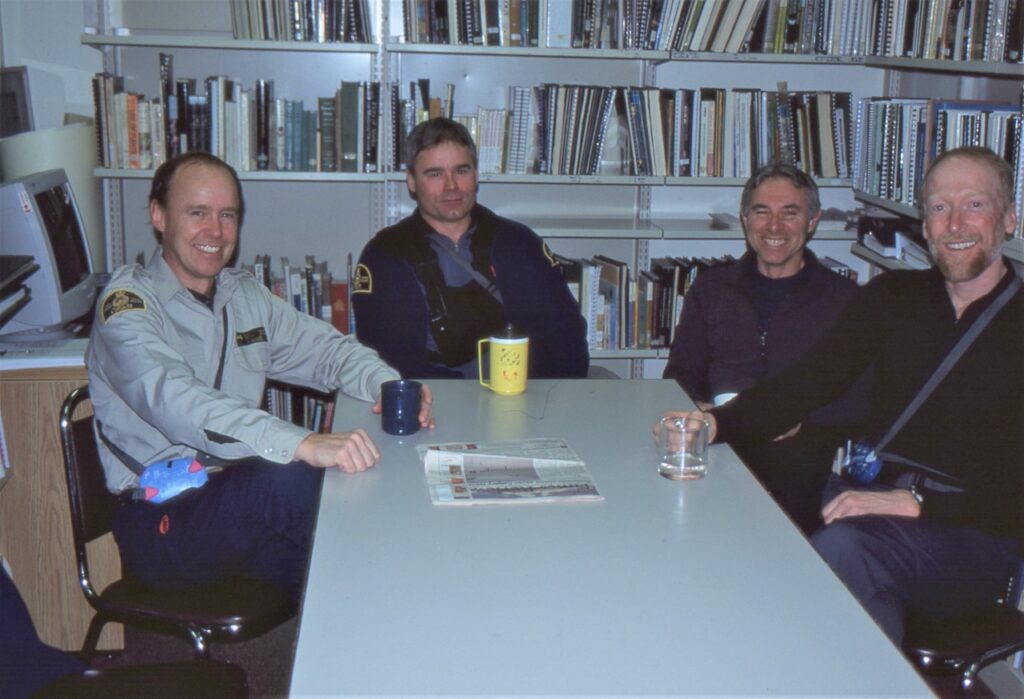
Derek, Brent Kozachenko, Keith McDougall and, Edwin Knox. Photo courtesy of Edwin Knox.
Derek – February 24, 2003. Photo contributed by Edwin Knox
SH: So you started in Waterton when?
Derek: I started in Waterton in 1974 and then I went to Forillon in the early 80’s. I returned to Waterton and ended my career there in 2008.
SH: What did you like about being a warden?
Derek: Well, there were so many things I liked about it. One of the things that would be right at the top of the list was all the people I worked with. That’s one of the things I loved about working in Parks Canada. Most of the people by far, shared a similar value system. We pretty much always had good Superintendents and I always respected the Chief Wardens too: Max Winkler, Al Sturko and Bill Dolan. They were on top of their game! They were all dedicated and professional. That’s pretty important when the people you hang out with and work with are all keen on the same sorts of things.
I also bought into the mandate, the vision and mission, which we used to talk about a lot for a few years anyway. I believed in it. I believe these big tracts of landscape are really special and I really liked to be part of the organization that was working to protect them, and for people to enjoy too. It was really important. I also really liked the physical landscapes that I worked in all the time. I loved the mountains, I loved the ocean, the lakes, the prairies and being in the forest … there were so many things that I liked about it.
There was always a new challenge from day to day, from week to week and from year to year, so I really enjoyed that aspect of it as well. And I liked working in a community or team environment but also having lots of time alone while carrying out projects.
Another thing I liked was the feeling that you were part of a brotherhood of wardens that extended well beyond Waterton. We would meet each other on training courses, meetings, or even projects in different places and we got to know each other. You felt that you were part of something bigger and felt connected. When something happened in another park, we would know the people involved.
SH: What didn’t you like about being a warden?
Derek: There wasn’t very much I didn’t like. One of the few things is that you’d work with some really neat people. Those people might have been in a seasonal position or had an opportunity to transfer to another park for career advancement or whatever, so they would move. You’d lose a good acquaintance or a good friend. Bev and I were always kind of saddened by that a little bit, although you’re happy to see them moving on and getting into something better for themselves, but you kind of miss them. Even now, good friends that we had over the years have moved to distant locations. It’s kind of neat in one way because you can go there and see these people and have a place to stay and vice versa, but it would be really nice if they were closer. I think I was very lucky that I always worked with really good people and had managers or bosses that I respected. I guess if I had problems with my bosses or other staff I wouldn’t have liked it so much, but that never happened to me.
I guess one thing I could say is I had a little concern occasionally. Sometimes there was a stressful situation or difficult things you had to deal with. It could be getting prepared to go out on a difficult rescue, or perhaps there was some wildlife hanging around the community or campgrounds, or backcountry campgrounds …. bears or cougars that you are dealing with. Some tense law enforcement situation. Those could be stressful because it’s important that you are doing the right thing and following the guidelines because people could get hurt. There were times when there were stressful situations, but the simple answer is there was really very little that I didn’t like. I really did like the job and working for Parks. (Tape Part 1: 19:25). Best career I ever could have had! I actually contemplated that I might like to do something else at one point in time. That lasted for about a day.
SH: Great answer. What are some of the more memorable events of your Warden Service career?
Derek: When I look back a little bit over my career and think about things, I guess what was memorable for me was some of the things I felt that we actually achieved working as a small team of wardens, and the things we got involved in. Some of the memorable events of course would include all the winter and summer mountaineering and the search and rescue training that was carried out both with Peter Fuhrmann and Willi Pfisterer, our two alpine specialists. We were really fortunate in Waterton. I know most of the people in Jasper worked with Willi, and Banff had Peter for the most part. But in Waterton we got to go out with both of them a lot. I really did enjoy that aspect. We spent a lot of time in the mountains for extended periods of times. I was out anywhere from days to weeks and even longer. In Banff, Jasper, Yoho, Glacier, and even up in Kluane in the Saint Elias Range, and Waterton. I worked for about a month and a half in Glacier National Park in the avalanche program when I went there on an assignment in the late 70’s. I worked with Peter Schaerer collecting data for their avalanche program. That was very exciting, and I got into some of the most interesting skiing that I’d ever been involved with in my life. Going down some really extreme avalanche paths and what not. Skiing beyond my actual capability but I suppose that was part of what it was all about.
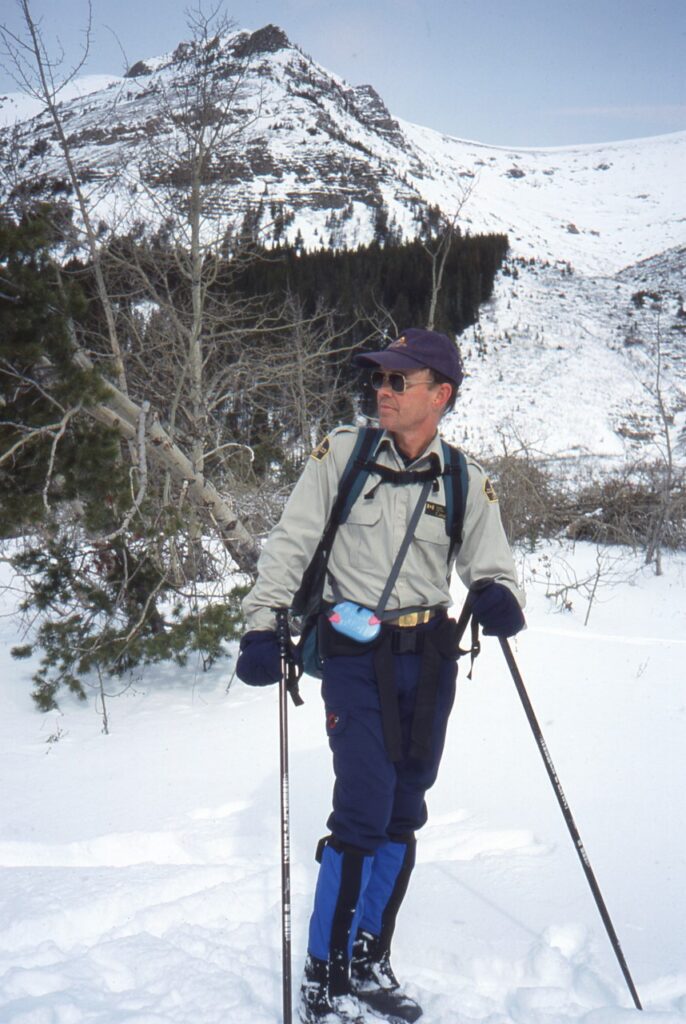
Photo courtesy of Edwin Knox.
